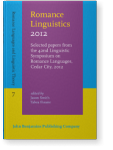Harmonic serialism and syncope and stress shift in Latin
This paper discusses two Latin stress shift cases that are problematic for a metrically-conditioned syncope analysis using Harmonic Serialism. The first case receives a straightforward account by replacing the constraints Max-Pr (no stress removal) and Dep-Pr (no stress assignment) by the constraints Max-Ft (no foot removal) and Dep-Ft (no foot assignment). Inscriptive and textual evidence shows that the second case, hitherto dated as Pre-Classical Latin, occurs in Classical and Late Latin as well. Syncope and shift in this case cannot be analyzed as metrically-conditioned and will be analyzed as stress doublets, thereby rendering, like opaque syncope, stress opaque already in Classical Latin.
